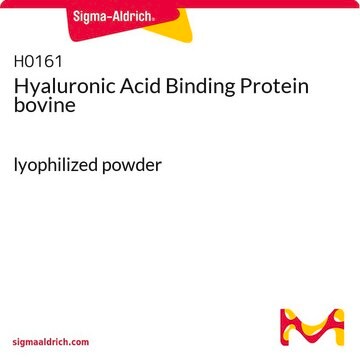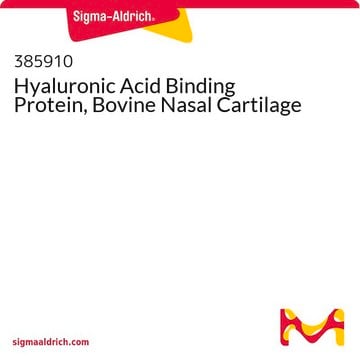385911
Hyaluronic Acid Binding Protein, Bovine Nasal Cartilage, Biotinylated
Synonym(s):
Binding Protein for Hyaluronic Acid, Biotinylated Hyaluronic Acid Protein, Bovine Nasal Cartilage Protein
About This Item
Recommended Products
biological source
bovine (nasal cartilage)
Quality Level
form
lyophilized
manufacturer/tradename
Calbiochem®
storage condition
OK to freeze
shipped in
wet ice
storage temp.
−20°C
General description
Warning
Physical form
Reconstitution
Other Notes
Kohda, D., et al. 1996. Cell 86, 767.
Heinegard, D., and Hascall, V.C. 1974. J. Biol. Chem. 249, 4250.
Legal Information
Storage Class Code
11 - Combustible Solids
WGK
WGK 1
Flash Point(F)
Not applicable
Flash Point(C)
Not applicable
Regulatory Listings
Regulatory Listings are mainly provided for chemical products. Only limited information can be provided here for non-chemical products. No entry means none of the components are listed. It is the user’s obligation to ensure the safe and legal use of the product.
JAN Code
385911-0UG:
385911-50UG:
385911-2MG:
385911-1MG:
385911-UG:
Certificates of Analysis (COA)
Search for Certificates of Analysis (COA) by entering the products Lot/Batch Number. Lot and Batch Numbers can be found on a product’s label following the words ‘Lot’ or ‘Batch’.
Already Own This Product?
Find documentation for the products that you have recently purchased in the Document Library.
Customers Also Viewed
Articles
Explore the role of hyaluronan, hyaluronic acid structure, hyaluronan synthesis & degradation, and more. Find GAGs, hydrogels, and scaffold kits.
Our team of scientists has experience in all areas of research including Life Science, Material Science, Chemical Synthesis, Chromatography, Analytical and many others.
Contact Technical Service











